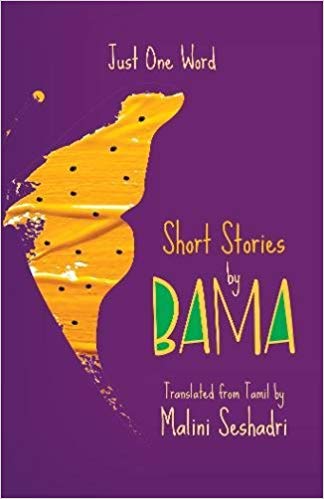The Tamil Dalit woman writer Bama has been a phenomenal name in the contemporary Dalit literary terrain. Widely celebrated for her life-writing Karukku (which completed its 25th year of publication in December 2017), her recently published book Just One Word, a compilation of fifteen short stories translated from Tamil into English by Malini Seshadri heralds a new chapter in her literary life. Written between 2003 and 2015, the stories ferry the readers into the quotidian travails yet spirited lives of the rural folks, the schools as well as urban settings, each of them building upon themes such as (evolving) caste practices, patriarchy, pedagogy and social evils like female foeticide.
Stories like ‘The Grazing Fields’ and ‘This Man’ dwell upon the village folks whose lives are laced with an element of fatalism, with equal measures of tears and laughter, rice gruels and lively gimmicks. While the village life offers them very little in terms of opportunities or upward mobility, they embrace it upfront, weather it and enliven it to the maximum limit possible. Another major setting in the stories is the school, a ‘modern’ space where young minds are supposed to comingle unencumbered. Yet this ‘modern’ space of learning (and unlearning), far from being alien to caste is in fact adapted to caste practices and untouchability. The narrator indicts both teachers and family as an institution for fostering caste in classrooms and drilling it deliberately into young minds. So for example the ‘upper caste’ schoolchildren are indoctrinated at home not to drink water from the cheri (Dalit neighbourhood) taps or interact with the cheri children, the headmaster instructs them that they could drink from the ‘cheri taps’ but should refrain from drinking in ‘cheri homes’ (p. 16). Likewise a teacher gives a lesson to her class on a poem (which negates the validity of caste and urges for a social revolution), she herself practices caste blatantly with her Dalit colleague. The narrator acerbically projects the pedagogic practices in a critical light and suggests an alternative way in which the malleable minds are invited to actively join in the (un)learning process. Being a teacher herself, the author brings in first-hand experience and insights and infuses them artistically in these stories.

